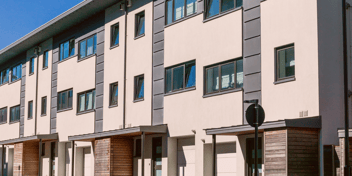Solving the 'No Access' Problem for Housing Associations
For housing associations, the issue of "no access" appointments is more than just an inconvenience — it's a costly and far-reaching problem that affects both operational budgets and tenant wellbeing. At Crimson, we recognise this challenge and work alongside housing associations to address it effectively, leveraging a tailored methodology designed to drive meaningful change.
This post explores the financial and human costs of "no access" cases, the underlying causes, and how a strategic mix of people, process, technology, and data solutions can transform the way housing associations tackle this perennial issue.
The Cost of "No Access": Beyond the Numbers
Imagine this scenario. A housing association with 22,000 homes is responsible for conducting gas safety checks, stock condition surveys, fire risk assessments, and more—all on tight regulatory deadlines. With annual visits totalling 90,500, if 35% of these appointments fail due to "no access", the immediate operational cost alone amounts to over £2 million annually if we estimate that each visit costs around £65.
However, the true cost of "no access" goes far beyond re-scheduling fees and technician time. Additional impacts include:
- Exacerbated Repairs: Delays can turn minor issues into major structural damage, escalating repair costs.
- Regulatory Penalties: Missing compliance deadlines—such as for gas safety checks—can result in unlimited fines.
- Administrative Burdens: A flood of tenant complaints raises operational overheads.
- Health Risks and NHS Impact: Issues like damp and mould, left unresolved, can harm tenant health, contributing to wider societal costs.
Critically, the social impact on tenants cannot be ignored. Delayed boiler repairs can leave families without heating in winter, while unresolved damp in homes can lead to respiratory illnesses. The ripple effects may lead to tenant dissatisfaction, fostering strained relationships between housing associations and the communities they serve.
Understanding Root Causes
"No access" cases occur for a variety of reasons, ranging from outdated systems to mismatched tenant communication. Some of the primary culprits include:
1. Uncoordinated Systems and Siloed Databases
Housing associations often work with multiple disconnected systems, such as CRM platforms, housing management systems, and property maintenance databases. This lack of integration means tenants may be overwhelmed with multiple appointments in a single week, making it impossible to honour them all.
2. Outdated Tenant Data
When CRM systems store incorrect or out-of-date information, important appointment details—such as texts or emails—may never reach tenants.
3. Insufficient Flexibility
Rigid scheduling without room for tenant preferences exacerbates the problem, especially for those with demanding work commitments or caregiving responsibilities.
4. Demographic and Situational Barriers
Vulnerable tenants, such as single women who may feel unsafe or elderly tenants unable to open their doors, may unintentionally contribute to "no access" cases.
These challenges highlight the urgent need for housing associations to implement smarter, data-driven solutions tailored to the diverse needs of their communities.
Crimson’s Approach to Driving Change
Transformation begins with understanding that no two housing associations are the same. At Crimson, we employ a dynamic methodology that focuses on identifying the unique factors at play within each organisation and tailoring a strategy that interweaves people, process, technology, and data. Here's how our approach works:
1. People
We focus on fostering collaboration within teams, ensuring all departments—from customer service to property maintenance—are aligned in their goals. Training staff to handle complex tenant communications to capture strategically important data is critical to improving access rates.
2. Process Efficiency
Simplifying and streamlining appointment bookings is fundamental. This includes enabling coordinated scheduling across departments to prevent tenants from being overwhelmed by multiple visits. Well-structured workflows ensure operational efficiency with minimal admin burdens.
3. Technology Integration
Disconnected systems are a major contributor to "no access" issues. By integrating technologies, such as CRMs, housing management systems, and tenant portals, associations can ensure a single source of truth for all tenant data. Enhanced flexibility through features like real-time rescheduling and automated reminders transforms tenant engagement.
4. Data Insights
Harnessing data is central to driving improvement. Predictive analytics, powered by tools like Power BI, can identify patterns in tenant behaviour—e.g., frequently missed appointments—and inform proactive strategies. Tenant demographic data can also inform tailored approaches for vulnerable individuals.
By combining these four pillars, housing associations can reduce "no access" appointments, ensuring greater cost efficiency and improved tenant outcomes.
Real-World Impact
When housing associations implement smart scheduling technology, they can expect a significant reduction in "no access" cases. For example, predictive scheduling can align appointments with tenant availability, significantly decreasing missed visits. Similarly, integrated systems allow staff to communicate proactively and update tenants on any changes in real time, fostering trust and accountability.
The result? Reduced operational costs, improved tenant satisfaction, and a stronger relationship between housing associations and their communities.
Looking Ahead
The issue of "no access" is more than just a line item on an expense sheet. It speaks to the operational challenges and societal responsibilities housing associations face. By taking a proactive, strategic approach to tackle this problem head-on, organisations can ensure compliance, improve tenant trust, and optimise costs.
At Crimson, we’re committed to empowering housing associations through tailored solutions that drive real change. If you’re ready to explore how to reduce "no access" cases in your operation, you can start by booking a 15-minute Discovery Call. Together, we can build more connected, collaborative systems and transform the way housing associations serve their communities. We can also help you build your business case for constructive change.
Contact Crimson today and take the first step toward solving the 'no access' challenge.
Read On

If Disney Did Housing, Higher Education and Homebuilding – What Experience Design Really Looks Like
If Disney launched a university, managed social housing, and built new homes, how would the world...

